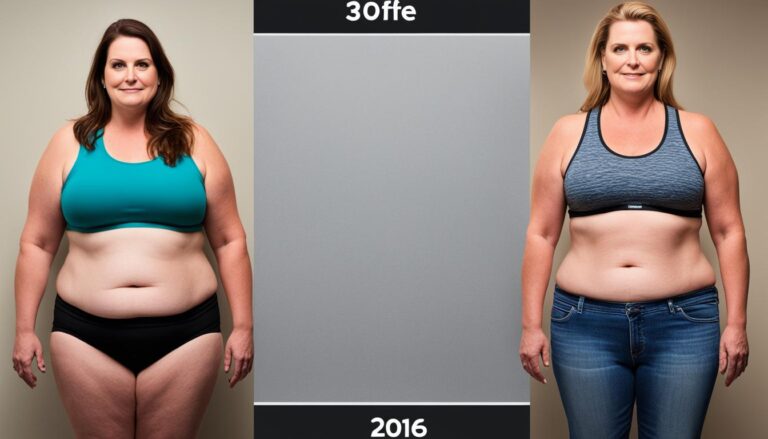Why Does Fat Fill You Up?
When it comes to feeling full and satisfied after a meal, fat plays a crucial role. But why does fat fill you up? Understanding the fat filling effect and the role of fat in feeling full can help you make informed choices about your diet and overall health.
Key Takeaways:
- Fat slows digestion, increases fullness, and decreases appetite.
- Protein, along with fat and fiber-rich carbohydrates, can increase satiety and make you feel fuller longer.
- Choosing healthy sources of protein and fat is important to decrease the risk of heart disease and diabetes.
- Water, fiber, and vitamins can also affect appetite and help you feel fuller.
- Overcoming the fear of fat and focusing on the right types of fats can support sustainable weight loss and optimal health.
The Impact of Protein on Satiety
When it comes to feeling full and satisfied after a meal, protein plays a key role. Consuming an adequate amount of protein can increase satiety, decrease appetite, and help regulate your overall food intake. A high protein diet has been shown to have significant effects on satiety and can be an effective strategy for managing weight.
In a study published in The American Journal of Clinical Nutrition, participants who consumed a high protein diet experienced increased feelings of fullness and reduced hunger compared to those on a lower protein diet. The study found that consuming 35 percent of total calories from protein, which is on the higher end of the recommended range, had a significant impact on satiety and appetite control.
It is believed that protein’s ability to increase satiety is due to its effect on several satiety hormones, including ghrelin and peptide YY, which regulate hunger and fullness signals in the body. Additionally, protein takes longer to digest compared to carbohydrates, resulting in a prolonged feeling of fullness and reduced snacking between meals.
The Impact of Protein on Satiety: Key Points
- Protein plays a crucial role in increasing feelings of fullness and reducing appetite.
- A high protein diet can significantly impact satiety and help with weight management.
- Protein affects satiety hormones and takes longer to digest, resulting in prolonged fullness.
- Including protein-rich foods in your meals and snacks can help you feel satisfied and reduce the risk of overeating.

| Protein-Rich Foods | Protein Content (g) per 100g |
|---|---|
| Chicken Breast | 31g |
| Greek Yogurt | 10g |
| Almonds | 21g |
| Tofu | 8g |
| Salmon | 22g |
The Role of Fat in Feeling Full
When it comes to feeling full, fat plays a crucial role in our satiety levels. One of the main reasons fat can help us feel fuller is because it slows down digestion. This means that the body takes longer to break down and absorb fat compared to other nutrients. As a result, fat stays in the stomach for a longer period of time, leading to increased fullness and decreased appetite.
In addition to slowing digestion, fat also has a higher caloric density compared to other macronutrients. This means that a smaller amount of fat can provide more calories compared to an equivalent amount of carbohydrates or protein. While this can lead to increased calorie intake if consumed in excess, it can also contribute to increased satiety when consumed in appropriate portions.
Research has shown that certain types of fat, such as monounsaturated fats and omega-3 fatty acids, have an even greater effect on increasing fullness and decreasing appetite. These healthy fats can activate key receptors in the body that regulate appetite and promote the release of satiety hormones.
The Importance of Choosing Healthy Sources of Fat
When incorporating fat into our diets, it’s important to choose healthy sources that offer additional nutritional benefits. For example, foods like avocados, nuts, and olive oil provide monounsaturated fats along with important vitamins and minerals. Incorporating these sources of fat into our meals can help us feel fuller for longer while also providing essential nutrients for overall health.
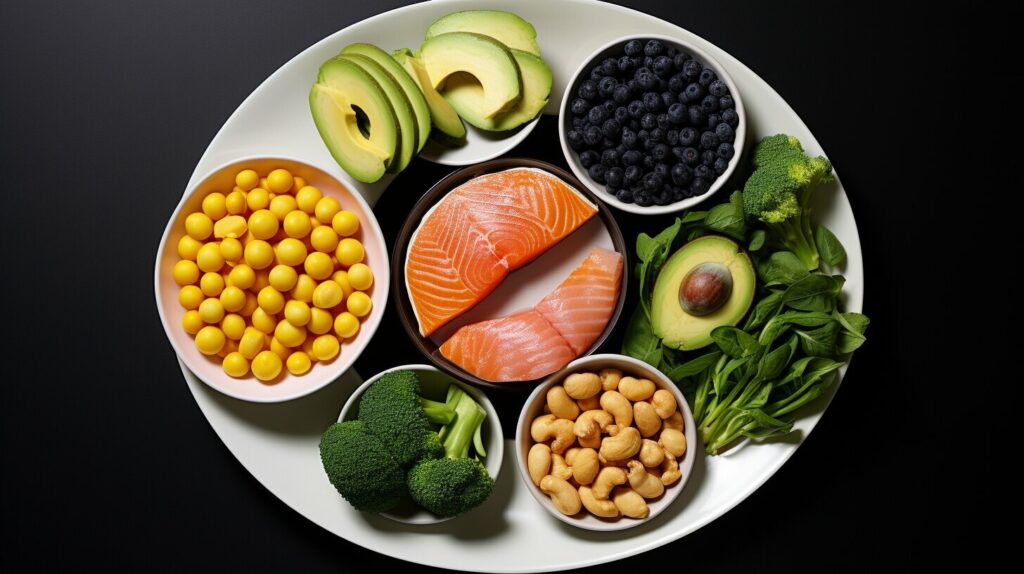
On the other hand, it’s important to limit the intake of unhealthy fats, such as saturated fats and trans fats. These fats have been associated with an increased risk of heart disease and other health issues. Foods high in saturated fats include butter, fatty cuts of meat, and full-fat dairy products. Trans fats are often found in processed and fried foods.
In conclusion, fat plays an important role in our feelings of satiety and fullness. It slows down digestion, increases fullness, and decreases appetite. Choosing healthy sources of fat, such as monounsaturated fats and omega-3 fatty acids, can provide additional nutritional benefits and support optimal health. By incorporating fat into our diets in a balanced and mindful way, we can harness its satiating power and promote overall well-being.
The Influence of Water, Fiber, and Vitamins
When it comes to feeling full, the role of water, fiber, and vitamins should not be overlooked. These three factors can significantly impact appetite and gastric emptying, helping you stay satisfied for longer.
Firstly, water is essential for maintaining proper hydration and can play a role in appetite regulation. Drinking an adequate amount of water throughout the day can help fill the stomach, making you feel fuller. Additionally, staying hydrated can prevent mistaken thirst for hunger, reducing unnecessary snacking.
Fiber-rich foods, such as fruits, vegetables, and whole grains, also contribute to feelings of fullness. Fiber takes longer to digest, expands in the stomach, and slows down gastric emptying, leading to increased satiety. Incorporating these foods into your meals can help control your appetite and prevent overeating.
Vitamins, along with other essential nutrients, are crucial for overall health, but they can also have an impact on appetite. A study on multivitamin supplementation found that participants reported reduced hunger compared to those who took a placebo. Ensuring you meet your daily vitamin requirements can help regulate your appetite and support overall well-being.

Choosing Healthy Sources of Protein and Fat
When it comes to maintaining a healthy diet, choosing the right sources of protein and fat is crucial. Opting for healthy options can significantly reduce the risk of heart disease and diabetes, while also providing essential nutrients for overall well-being. Here are some key recommendations for incorporating healthy sources of protein and fat into your diet:
Protein Choices
- Include plant-based protein sources such as tofu, beans, and nut butters. These options are not only rich in protein but also packed with fiber and other essential nutrients.
- Opt for lean cuts of meat, skinless poultry, and fish. These animal protein sources provide high-quality protein while being lower in unhealthy saturated fats.
Fat Choices
- Choose unsaturated fats found in plant sources like avocados, nuts, and seeds. These fats have been linked to a decreased risk of heart disease and diabetes.
- Limit your intake of unhealthy saturated fats, primarily found in animal and dairy products. These fats can increase the risk of heart disease and should be consumed in moderation.
By making these simple adjustments to your diet, you can ensure that you are getting the right balance of protein and fat while promoting overall health and well-being.

| Protein Sources | Fat Sources |
|---|---|
| Tofu | Avocados |
| Beans | Nuts and seeds |
| Nut butters | Olives and olive oil |
| Lean cuts of meat | Fatty fish (salmon, mackerel) |
| Skinless poultry | Canola oil |
Remember, it’s not just about the quantity of protein and fat in your diet but also the quality. Choosing healthy sources can make a significant difference in your overall health and reduce the risk of chronic diseases. So, next time you’re planning a meal, opt for these nutritious options to support your well-being.
The Impact of Fatty15 on Snacking and Hunger
Fatty15 is a revolutionary daily supplement that can help decrease snacking and reduce feelings of hunger. Its key ingredient is C15:0 (pentadecanoic acid), a unique saturated fatty acid found in butter and other whole-fat dairy products. By incorporating Fatty15 into your daily routine, you can experience the benefits of C15:0 and support your weight management goals.
Studies have shown that C15:0, along with other saturated fatty acids, can help decrease snacking and curb feelings of hunger. It works by enhancing cellular resilience, restoring mitochondrial function, and activating key receptors that regulate appetite. As a result, many individuals who incorporate Fatty15 into their diet have reported decreased between-meal snacking and reduced appetite.
Consumer feedback and testimonials further emphasize the positive impact of Fatty15 on snacking and hunger. Many individuals have found that Fatty15 has helped them better manage their cravings and stay on track with their dietary goals. By reducing the frequency of snacking and controlling hunger levels, Fatty15 can provide valuable support to those striving for a healthier lifestyle.
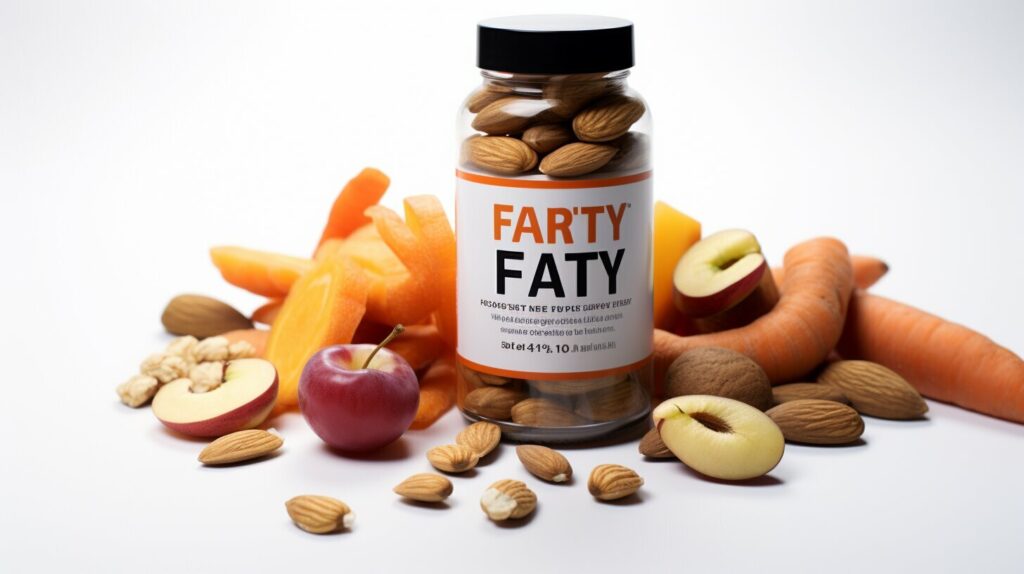
The Science Behind Fatty15
“Incorporating Fatty15 into my daily routine has been a game-changer in terms of managing my snacking habits. I now feel more satisfied between meals and have noticed a decrease in cravings. Fatty15 has truly made a difference in my weight management journey.” – Sarah B.
Fatty15’s effectiveness is backed by scientific research and the understanding of how fatty acids influence appetite and satiety. The unique properties of C15:0 set it apart as a powerful tool in reducing snacking and hunger. By taking advantage of the benefits of Fatty15, individuals can support their weight management efforts and promote overall well-being.
Overcoming Fear of Fat for Weight Loss
Many people have a fear of fat due to past dietary recommendations promoting low-fat diets. However, cutting back on saturated fats and increasing carb intake, particularly from refined carbs and sugar, can lead to weight gain and a higher risk of obesity, heart disease, and type 2 diabetes. Healthy fats, like unsaturated fats, stabilize blood sugar, keep you fuller longer, and reduce snacking, making them a better choice for sustainable weight loss.
The fear of fat stems from the belief that consuming fat will make you gain weight. However, research suggests that it’s not fat itself that causes weight gain, but rather the excess consumption of refined carbohydrates and added sugars. These carbohydrates are quickly digested and absorbed, causing blood sugar levels to spike and crash, leading to increased cravings and overeating.
By including healthy fats in your diet, such as those found in avocados, nuts, seeds, and olive oil, you can achieve better satiety and control over your appetite. These fats provide a slow and steady release of energy, preventing blood sugar fluctuations and the subsequent cravings for sugary and high-carb foods. Additionally, the inclusion of healthy fats in your meals can help you feel more satisfied and reduce the desire for between-meal snacking.

It’s important to note that not all fats are created equal. While unsaturated fats are beneficial for weight loss and overall health, saturated and trans fats should be consumed in moderation. Saturated fats, found in animal and dairy products, can increase cholesterol levels and the risk of heart disease if consumed excessively. Trans fats, found in processed and fried foods, have no health benefits and should be avoided entirely.
In conclusion, overcoming the fear of fat and focusing on the right types of fats can support sustainable weight loss and overall health. By incorporating healthy sources of fat into your diet, you can stabilize blood sugar, feel fuller longer, and reduce cravings for unhealthy refined carbs and sugars. Remember to choose unsaturated fats, such as those found in avocados, nuts, seeds, and olive oil, while limiting saturated and trans fats for optimal well-being.
The Relationship Between Fat and Blood Sugar Regulation
The impact of fat on blood sugar regulation is an important aspect to consider when exploring the role of fat in feeling full. Unlike carbohydrates, fat digestion is slower, resulting in a slower release of glucose into the bloodstream. This slower release helps stabilize insulin levels, preventing the rapid spikes and crashes that can occur after consuming high-carb meals.
High-carb meals can cause blood sugar levels to spike, leading to overstimulation of insulin and increased storage of body fat. In contrast, a low-carb, high-fat diet can provide a more stable energy source and prevent excessive hunger. Studies have shown that individuals following low-carb diets experience less hunger compared to those on low-fat, high-carb diets.
| Low-Carb, High-Fat Diet | Low-Fat, High-Carb Diet |
|---|---|
| Stabilizes blood sugar levels | Causes blood sugar spikes |
| Prevents excessive hunger | Increases hunger and cravings |
| Promotes fat burning | Promotes fat storage |
Choosing the right types of fat is crucial for blood sugar regulation. Healthy unsaturated fats, such as those found in avocados, nuts, and olive oil, can stabilize blood sugar levels and help keep you fuller for longer. On the other hand, trans fats should be avoided as they can increase inflammation and cholesterol levels.
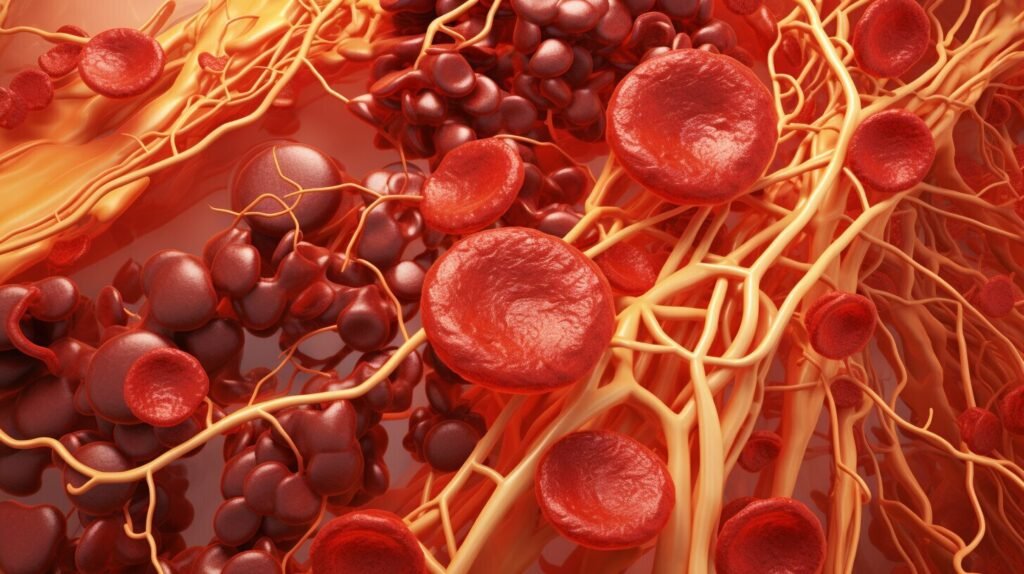
In summary, fat plays a significant role in blood sugar regulation and hunger levels. Incorporating healthy fats into your diet, while reducing intake of high-carb foods, can help stabilize blood sugar levels, prevent excessive hunger, and promote overall well-being.
The Satiating Power of Fat
When it comes to feeling full and satisfied after a meal, fat plays a crucial role. Not only does it provide a rich and satisfying flavor, but it also has a unique impact on hormone regulation in the body, specifically regarding appetite. Consuming fat activates the release of leptin, a hormone that signals to the brain that you have received enough fat and reduces your appetite.
Studies have shown that healthy unsaturated fats, such as those found in avocados, olive oil, and nuts, have a positive effect on satiety. These fats help regulate the release of appetite-reducing hormones, making you feel fuller for longer periods. In contrast, diets low in fat and high in refined carbohydrates can lead to increased hunger and snacking between meals.
Fat also has the advantage of being slower to digest compared to carbohydrates and protein. This slower digestion process means that the feeling of fullness lasts longer, keeping hunger at bay. Additionally, consuming fat as part of a balanced meal can help stabilize blood sugar levels, preventing spikes and crashes that can lead to cravings and overeating.
To incorporate healthy fats into your diet, opt for sources like avocados, olive oil, nuts, and seeds. These fats not only provide satiety but also offer important health benefits, such as reducing inflammation and improving cholesterol levels. Remember to enjoy fats in moderation as part of a well-rounded eating plan.

Key Takeaways:
- Fat activates the hormone leptin, which reduces appetite and signals satiety to the brain.
- Healthy unsaturated fats, like those found in avocados and nuts, have a positive effect on satiety and help regulate appetite-reducing hormones.
- Fat is slower to digest than carbohydrates and protein, leading to prolonged feelings of fullness.
- Incorporating healthy fats into your diet can help stabilize blood sugar levels and prevent cravings and overeating.
By embracing the satiating power of fat and choosing healthy sources, you can support your overall well-being and maintain a satisfying and balanced diet.
The Essential Role of Fat in Overall Health
When it comes to our overall health, fat plays a vital role in supporting basic bodily functions. It serves as an essential energy source, providing the body with a concentrated form of calories that can be used for fuel. In addition to being an energy source, fat also plays a crucial role in hormone balance, brain function, and nutrient transport.
Essential fatty acids, such as omega-3 and omega-6, are required for the proper functioning of the body but cannot be produced by the body itself. These fatty acids are necessary for the production of hormones, which regulate various bodily processes, including inflammation, blood clotting, and immune response. They also contribute to brain and nervous system development and function.
Fat is also involved in the transport of fat-soluble vitamins, such as vitamins A, D, E, and K, throughout the body. These vitamins are necessary for maintaining healthy skin, vision, immune function, and bone health. Without adequate fat intake, the absorption and utilization of these vitamins may be impaired.
Fatty Acid Types and Sources
It’s important to note that not all fats are created equal. There are different types of fats, including saturated fats, monounsaturated fats, and polyunsaturated fats. Each type has a different effect on our health, and it’s important to choose the right fats for optimal well-being.
| Fat Type | Sources |
|---|---|
| Saturated Fats | Animal products (meat, dairy), coconut oil, palm oil |
| Monounsaturated Fats | Olive oil, avocados, nuts, seeds |
| Polyunsaturated Fats | Fatty fish (salmon, mackerel, trout), walnuts, flaxseeds, soybean oil |
While it’s important to include fat in our diets, it’s also crucial to moderate our intake and choose healthier sources. Limiting saturated fat intake from sources such as high-fat animal products can help reduce the risk of heart disease. Instead, opt for monounsaturated and polyunsaturated fats, which have been shown to have positive effects on cholesterol levels and inflammation. These healthy fats can be found in foods such as olive oil, avocados, nuts, seeds, and fatty fish.

In summary, fat is an essential component of our diet and plays a critical role in overall health. It provides energy, supports hormone balance, contributes to brain function, and facilitates the transport of important nutrients. By choosing the right types of fats and consuming them in moderation, we can optimize our well-being and promote long-term health.
The Importance of Choosing the Right Fats
When it comes to optimizing our health, understanding the different types of fats and choosing the right ones is crucial. Healthy fats, such as unsaturated fats, play a beneficial role in our overall well-being, while saturated fats should be consumed in moderation. These fats have different effects on our cholesterol levels, inflammation, and metabolism, making it essential to make informed choices about the fats we include in our diet.
Unsaturated fats, including polyunsaturated and monounsaturated fats, have been shown to have positive effects on our cholesterol levels. They can help improve our cholesterol profile by increasing levels of HDL (good) cholesterol and decreasing levels of LDL (bad) cholesterol. Foods rich in unsaturated fats, such as olive oil, avocados, nuts, and seeds, can be incorporated into our meals to promote heart health and overall well-being.
In contrast, saturated fats should be consumed in moderation, primarily from unprocessed sources such as lean meat and full-fat dairy. Consuming large amounts of saturated fats has been associated with an increased risk of heart disease. It’s important to be mindful of our intake and opt for healthier alternatives whenever possible. By choosing lean cuts of meat, skinless poultry, and low-fat dairy products, we can still enjoy the flavors we love while minimizing our risk of chronic diseases.
| Fat Type | Examples |
|---|---|
| Unsaturated Fats | Olive oil, avocados, nuts, seeds |
| Saturated Fats | Lean meat, full-fat dairy |
Additionally, it’s important to avoid trans fats altogether. Trans fats, often found in processed foods, margarine, and some fried foods, have been linked to increased levels of LDL cholesterol, inflammation, and a higher risk of cardiovascular disease. By reading labels and choosing foods that are trans fat-free, we can protect our heart health and overall well-being.
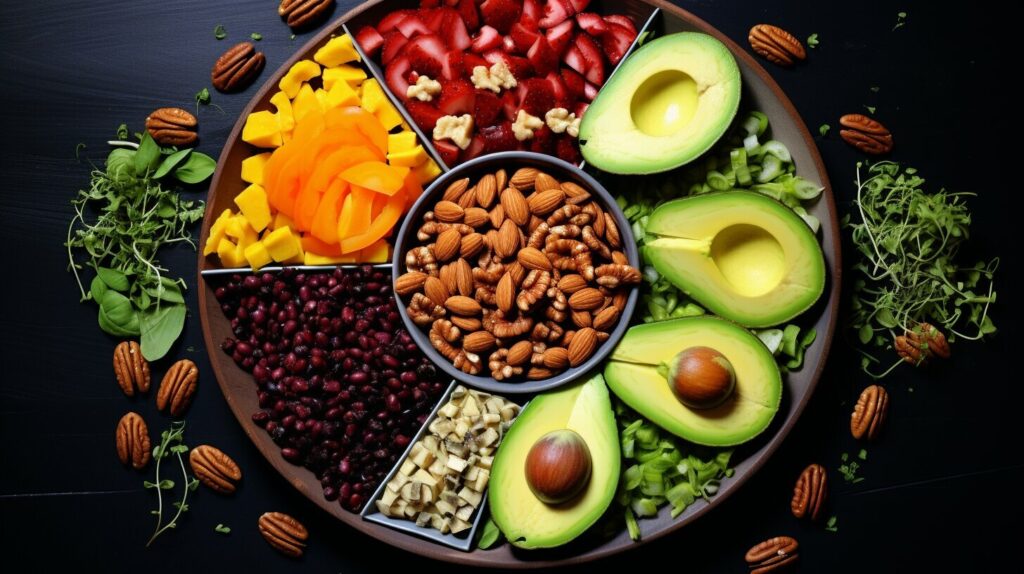
By being mindful of the types of fats we include in our diet, we can make choices that benefit our health in the long run. Incorporating healthy fats, such as unsaturated fats, and limiting our intake of saturated and trans fats can help us maintain a healthy cholesterol level, reduce inflammation, and lower our risk of chronic diseases. It’s all about making informed choices and prioritizing our well-being.
Conclusion
In conclusion, the role of fat in feeling full and satisfied cannot be understated. Fat has a unique filling effect on the body, slowing down digestion, increasing fullness, and decreasing appetite. This fat filling effect can be attributed to the activation of hormones that regulate appetite, such as leptin.
Choosing healthy sources of fat and protein is crucial for overall health and well-being. Opting for unsaturated fats found in olive oil, avocados, and nuts, while moderating intake of saturated fats from lean meats and dairy products, can support optimal health and reduce the risk of chronic diseases like heart disease and diabetes.
Understanding the importance of fat in filling us up can help overcome the fear of fat and make informed dietary choices. Incorporating a balanced intake of fat, protein, and fiber-rich carbohydrates can increase satiety, promote weight management, and support a healthy lifestyle. So, next time you wonder why does fat fill you up, remember its important role in making you feel fuller longer.
FAQ
Why does fat fill you up?
Fat slows digestion, increases fullness, and decreases appetite, making you feel fuller longer.
What is the impact of protein on satiety?
Protein has been shown to increase fullness and decrease appetite, making it a filling nutrient that can help you feel fuller longer.
How does fat play a role in feeling full?
When fat enters the small intestine, it slows digestion, increases fullness, and decreases appetite.
How do water, fiber, and vitamins influence appetite?
Water and fiber-rich foods take up more space in the stomach, making you feel fuller. Adequate vitamin intake has also been shown to affect appetite.
What are some healthy sources of protein and fat?
Better protein sources include tofu, beans, and nut butters, while lean cuts of meat, skinless poultry, and fish are recommended for fat intake. Unsaturated fats found in avocados and canola oil can decrease the risk of heart disease and diabetes.
How does Fatty15 impact snacking and hunger?
Fatty15, a daily supplement containing a pure form of C15:0, has been associated with decreased snacking and reduced appetite.
How can the fear of fat be overcome for weight loss?
Cutting back on unhealthy saturated fats and increasing consumption of healthy fats can support sustainable weight loss and decrease the risk of obesity, heart disease, and type 2 diabetes.
What is the relationship between fat and blood sugar regulation?
Fat digestion is slower than carb digestion, resulting in a slower release of glucose into the bloodstream. This helps stabilize insulin levels and prevent the storage of excess body fat.
How does fat have a satiating effect on the body?
Eating fat activates leptin, a hormone that signals to the brain that you have received enough fat and reduces your appetite. Healthy unsaturated fats have a positive effect on satiety and help regulate the release of appetite-reducing hormones.
What is the essential role of fat in overall health?
Fat plays a crucial role in supporting basic bodily functions, including energy production, hormone regulation, brain and nervous system structure, and transport of fat-soluble nutrients.
Why is it important to choose the right fats?
Healthy fats, such as unsaturated fats, have beneficial effects on cholesterol, inflammation, and metabolism. Saturated fats should be consumed in moderation, while trans fats should be avoided due to their negative effects on cholesterol and inflammation.

